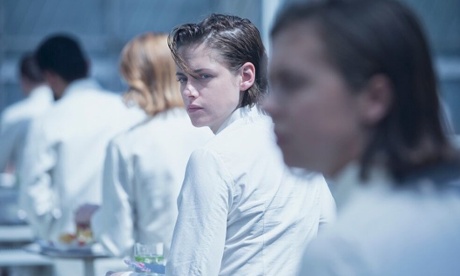
American director Drake Doremus made his name with Like Crazy and Breathe In, a pair of films about obstacle-strewn relationships filmed in a distinctively raw, improvisational style. He brings the same sense of frustrated yearning and jittery, unmediated tenderness to this film – but, rather remarkably, Doremus has gone all sci-fi with – if we’re being honest – a not entirely successful outcome. Equals resembles George Lucas’s classic fable of white-suit futurism THX 1138 as if reshot as a perfume commercial: Oppression, by Calvin Klein.
Nicholas Hoult and Kristen Stewart play Silas and Nia, two cogs in the machine of a post-apocalyptic society that has essentially outlawed emotions of any kind: relationships are illegal, friendship non-existent, and any behaviour other than automaton-like functionality is considered deviance worthy of reporting to the authorities, who claim it is the result of a virus called SOS, or “switched-on-syndrome”. Silas and Nia happen to work together in some sort of publication-creating unit, rather like a high-tech version of Orwell’s novel-writing machines in Nineteen Eighty-Four. Despite the perfectly co-ordinated bodysuits everyone wears, and the fabulously sleek living pods they occupy, things under the surface are awry: suicides regularly plop down from the upper floors, and occasionally “couplers” are brutally carted off to a scary sounding containment zone called “the Den”.
Pretty soon, Silas catches sight of Nia and feels the sap rising, as does she; they begin an uncontrollable but fantastically risky secret affair – again, very much like Orwell’s Winston and Julia. For acting out his emotions, however, Silas is diagnosed with SOS Stage 1 – considered incurable, with suicide the most efficient way out – but Nia is a “hidden”, able to control her behaviour and avoid arrest and detention.
Hoult and Stewart certainly give it their all, and both deliver sensitive, nuanced performances – but Doremus never really manages to solve the problem the afflicts the first half of the film: with everything and everyone moving at half speed, there’s an inbuilt dramatic inertness to proceedings that no amount of intense whispering and tremulous handholding can overcome. Things pick up in the second half when escape becomes an urgent issue; then, at least, a little narrative momentum is generated. Equals doesn’t really work as either a plausible attempt at rendering some sort of future society, nor as a really convincing thwarted-love story. Without the heft required, Doremus’s film never achieves lift-off

